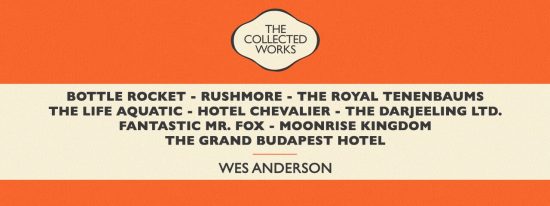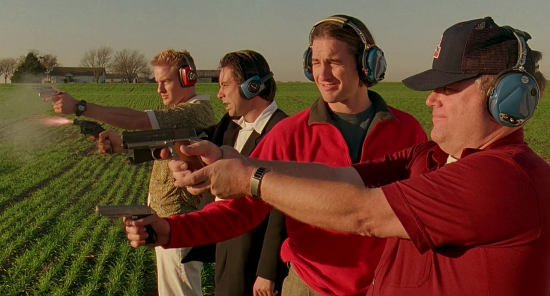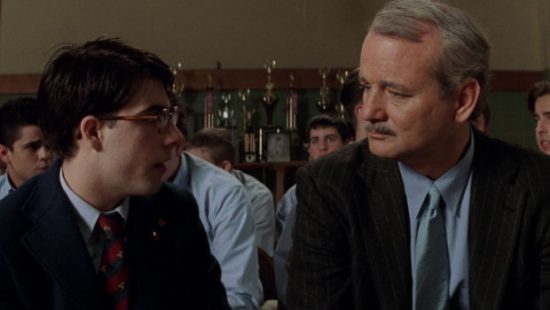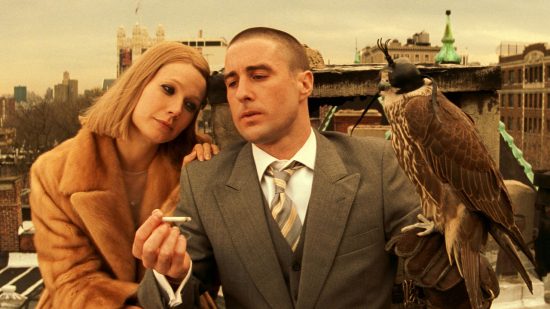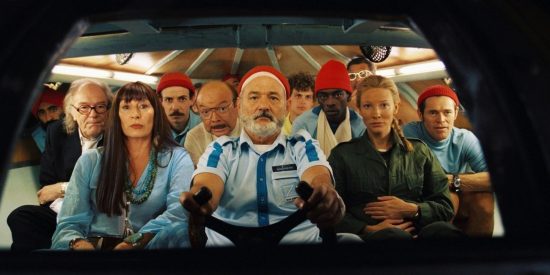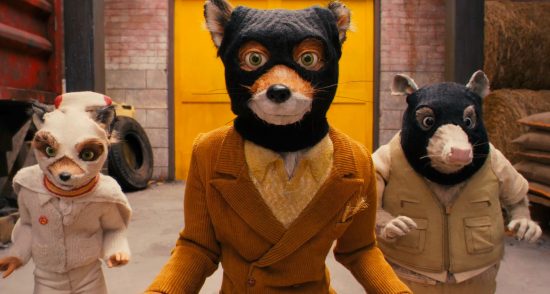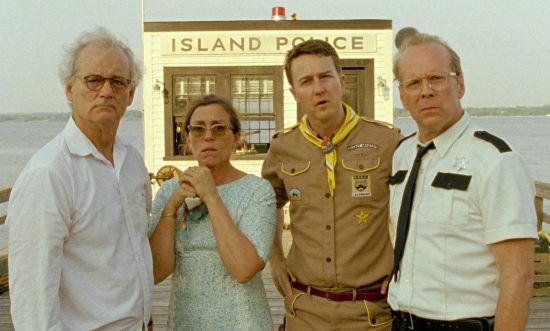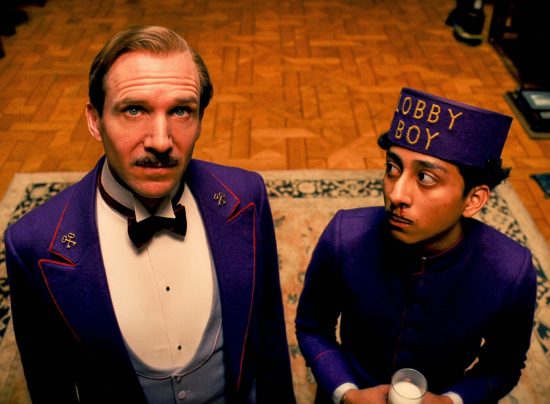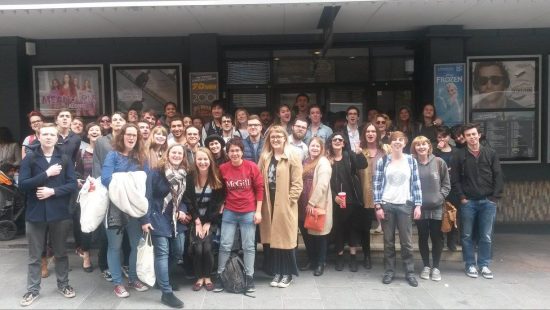Surviving The Wes Anderson Marathon at The Prince Charles Cinema
The aisles were littered with the remains of those who had survived and those who had not. Empty cans of drinks, abandoned bags of pop-corn and other beverages. The events of the night of Saturday 28th May 2016 had begun in earnest with some 285 souls on board for the journey that awaited them. They had all stood (or sat) excitedly in the queue with tremendous energy and boundless enthusiasm. Some forty to fifty people including myself were the only ones who made it through the whole night for the survivor’s photo that was taken when we were reunited with daylight. It’s a true test of whether you can honestly consider yourself what Marcel Martin termed “the true lover of movies.”
I quickly grabbed a seat at the end of the front row with lots of leg room upon entering the theatre, with easy access for all those toilet breaks, and soon enough it began. The lights dimmed, a congregation of Wes Anderson enthusiasts were plunged into darkness shortly before 9pm and we embarked on a journey that would last some fifteen hours until 12 noon the following day. It all started with a 13 minute black and white short filmed on 16mm film stock called ‘Bottle Rocket‘ (1994). Wes Anderson and Owen Wilson met at the University of Texas in a playwriting class and shortly after graduating made this fine first foray into filmmaking. It’s remarkable how much of the chemistry we associate with a Wes Anderson picture – the eccentricities, familial relationships and rivalries, the stark and deceptively simplistic cinematography, stylistic flourishes of calligraphy and the overriding fascination with criminality as explored through the prism of philosophical thought with its existential ennui – are all present in this first production that serves as a fitting prologue to the rich tapestry of cinematic movement that has been woven throughout the oeuvre of Wes Anderson.
Once more, it is joyous to be reminded how wonderfully talented Owen Wilson is as an actor and writer for he is an artist who is woefully underestimated and misunderstood by his critics and contemporaries. Indeed, as some may know and some may not, Owen Wilson never consciously intended to be an actor or actively sought it as a profession. He was a writer first with college roommate Wes Anderson and they went on to share an Academy Award nomination for Best Original Screenplay for penning ‘The Royal Tenenbaums’ in 2001. Anderson had originally intended to cast professional actors in his first short but when funds proved predictively sparse (something I am learning myself), the young director cast fellow writer Owen and his brother Luke Wilson in the lead roles. Perhaps it was startling blind luck that these two young men who had never acted before could deliver such pitch perfect performances or – more likely in my estimation – it was the very same qualities that Owen Wilson possessed and does indeed still possess as a writer in regards to his understanding of the innate psychology of human nature (at the sophisticated level of an astute philosopher I might add) which allowed and does allow him to deliver subtle and effective renditions as an actor of the vibrant characters he writes. All in all, the result is one of the finest short films I have ever had the pleasure of seeing.
As we all know however, the real excitement with such works is knowing the potential they contain, the promises they make and the prayers they then answer when they are transformed into a feature length film. This is exactly what happened with Paul Thomas Anderson when he made ‘Cigarettes and Coffee’ in 1993 which was adapted into ‘Hard Eight’ (1996) and this is also what happened to ‘Bottle Rocket.’ The short was submitted to the Sundance Film Festival and was quickly picked up by Columbia Pictures where it was made on 35mm colour film stock on a budget of $7million with James Cann playing a supporting role. Amazingly, thankfully, the Wilson brothers kept their lead roles. Hollywood didn’t pull its usual trick of displacing talented unknowns with random A-listers who are awkwardly unsuitable for the role. Like when they wanted Dolly Parton to play Julie Walters’ Golden Globe winning role in ‘Educating Rita’ (1983). Whilst ‘Bottle Rocket’ (1996) was a commercial flop it was critically acclaimed with Martin Scorsese calling it one of his favourite films of the nineties and crowning Wes Anderson ‘the new Scorsese.’ As far as high praise goes, it doesn’t get much better than that. It’s an auspicious debut by one of the finest filmmakers at work today. After a short break of approximately ten minutes or so, we were treated to ‘Rushmore’ (1998). A few things first:
a) Yes, I did skip through my commentary of ‘Bottle Rocket’ (1996) rather quick in a manner that could be taken by some as feckless. This is not my intention. If anything, that particular picture is one of my favourites of Anderson’s. I simply have a lot of coverage to get through in writing a piece that surmises the genius of one of America’s finest living filmmakers as viewed in one sitting more or less.
b) The Prince Charles Cinema are to be commended for their organisational skills. Seriously, the whole thing ran like clockwork. Any reservations I held prior to enduring this event were quickly dispelled in the majesty of Anderson’s world.
c) Why haven’t you booked a ticket for this yet? Do you not love movies?
All levity aside, lest I forget my purpose, back to the matter at hand I shall now return:
I read ‘Rushmore‘ before I watched it. Yes, that is ever so slightly eccentric of me. I also did this with ‘Crazy, Stupid, Love’ (2011) and unintentionally with ‘Sex, Lies and Videotape’ (1989). In the latter case, I only meant to read the opening scene of Steven Soderbergh’s Oscar nominated screenplay, which he reportedly wrote in 11 days on a yellow legal pad in longhand whilst travelling open road across America, and I was so captivated by the strength of his writing that I read the darn thing in its entirety in one sitting. Wow, I really must curb this pestilent habit I have of veering off topic, you know, like Harry says in the voice over segments of Shane Black’s ‘Kiss, Kiss, Bang, Bang!’ (2005), “Fuck, this is bad narrating.”
So, I read the script for ‘Rushmore’ on which Wes Anderson and Owen Wilson shared writing duties and was stunned by how much of a life it had as nothing more than ink on a page. To quote Scorsese who once compared the characters of Anderson’s pictures with those in the films of Jean Renoir, “He [Anderson] knows how to convey the simple joys and interactions between people so well and with such richness. This kind of sensibility is rare in movies.” This was the first film of the night of many which we had the luxury of seeing on 35mm photo-chemical film. It’s also the first of Anderson’s films to star Bill Murray (what sick sonofabitch wouldn’t love Billy Murray) who has subsequently appeared in every single motion picture the auteur has directed from that point to date. Murray is said to have been so enthralled with the script (as I was) that he said he would have done the film for nothing, such was his excitement at the prospect of being involved. Quick side note, (sorry, I really can’t help myself) over the coming years, Murray proved to be endearingly protective of the young director. Indeed, when Anderson was learning the meaning of the word diplomacy, when directing insanely brilliant but sometimes difficult to work with in a grouchy kind of way (so I hear) Gene Hackman, during principal photography of ‘The Royal Tenenbaums’ (2001), Billy Murray came onto set on his day off of all days to watch over Anderson whilst he was working with the legend who won an Academy Award for playing Popeye Doyle, in William Friedkin’s ‘The French Connection’ (1971), to ensure that the mild mannered and unfailingly polite Anderson was not messed with. What a sweetheart! Also, ‘Rushmore’ was also Jason Schwartzman’s film debut and he is superb as ambitious adolescent school student Max who falls deep in delusional unrequited love with Rosemary Cross, a first grade teacher at his prep school who is played by Olivia Williams. It all makes for one of the director’s finest films.
The third feature of the night and perhaps Anderson’s most celebrated piece de resistance was ‘The Royal Tenenbaums‘ (2001). It’s like an exquisite glass of whiskey. Few films possess as much refinery, sophistication, profundity, joie de vivre, wit and genius, all whilst being effortlessly cool. Take, if you will, the following line of dialogue that is delivered by Gene Hackman as the patriarch of the family, Royal Tenenbaum, “Can’t somebody be a shit for their whole life. And then try and repair the damage?” It’s a line that at the risk of being overtly simplistic encapsulates the central conflict of the film. That is, a story about a father who does his upmost (by ethically questionable means) to restore what Alec Baldwin’s sublime narration eulogizes in voice over as “the brilliance of the young Tenenbaums [that] had been erased by two decades of betrayal, failure and disaster.” It’s a heart felt film that is not to be missed. Especially in a world where so few films are made with such sincerity. To borrow the words of the illuminary Christopher Nolan: “Films are subjective – what you like, what you don’t like; but the thing for me that is absolutely unifying is the idea that every time I go to the cinema and pay my money and sit down and watch a film go up on screen, I want to feel that the people who made that film think it’s the best movie in the world, that they poured everything into it and they really love it. Whether or not I agree with what they’ve done, I want that effort there – I want that sincerity. And when you don’t feel it, that’s the only time I feel like I’m wasting my time at the movies.” Wes Anderson doesn’t waste your time.
The next two films I will breeze over succinctly. The films in question are ‘The Life Aquatic With Steve Zissou‘ (2004) and ‘The Darjeeling Limited‘ (2007), the latter of which is preceded by a short film that is attached to it titled ‘Hotel Chevalier’ which stars Jason Schwartzman, Natalie Portman and Peter Sarstetd’s splendid Number One Hit UK single from 1965, ‘Where Do You Go To My Lovely?’ It was at this point that my lack of sleep caught up with me around the 3am/4am mark and I dozed off intermittently. It somehow felt a somewhat spiritual experience as my mind fluctuated through states of consciousness as the world of Wes Anderson’s imagination continued to wash over me. Out of these two, I’d have to say ‘The Darjeeling Limited’ is the better film.
Once I’d caught up on my REM cycles (I probably got the sum total of an hours sleep in a 24 hour period) I was revitalized by one of my favourite Wes Anderson pictures which started somewhere around 6.45am. ‘Fantastic Mr. Fox‘ (2009). It is one of the most inventively executed animated films ever made that recalls the same class of refreshment as Stephane Aubrey’s and Vincent Patar’s ‘A Town Called Panic’ (2009), albeit in a style and voice entirely of its own design. Once more, like the best of family orientated films which are derived from literature written for and targeted predominantly at children, in this case stemming from the work of Roald Dahl, it functions on a multitude of levels that appeal to adults and children alike. Just because it is an animated film doesn’t mean you have to dumb things down like the woefully disappointing ‘The Secret Life of Pets’ (2016). It also has an incredible soundtrack which features Mick Jagger singing The Rolling Stones classic ‘Street Fighting Man’ or Brian Wilson’s symphony ‘Heroes and Villains’ from The Beach Boys which perfectly orchestrates a sequence where Fantastic Mr. Fox (George Clooney) carries out a daring robbery as he burgles the farms of Boggis, Bunce and Bean. Who knew a film about an anthropomorphised Fox could be as cool as anything directed by Martin Scorsese with the same level of virtuoso style as ‘Goodfellas’ (1990) or ‘Casino’ (1995)?
The penultimate film was ‘Moonrise Kingdom‘ (2012) which perhaps more than any Anderson film (though it is present throughout his work) astutely showcases the astonishing understanding and insight the writer/director possesses when it comes to knowing, capturing and relaying the extraordinary inner lives of children before they are plagued and broadsided by the confusion of adolescence and eventual adulthood. It’s a fitting appertizer to the marathon’s concluding piece.
Last but certainly not least, ‘The Grand Budapest Hotel‘ (2014). I think this is Anderson’s crowning achievement. The collective sense of excitement and admiration amongst myself and my fellow cineastes as this film began was palpable. Instead of continuing with the most obvious of routes with this article by simply outlining what the film is about in terms of plot, subject matter, themes, motifs and the films of Walerian Borowczyk which influenced it, such as ‘Goto, Island of Love’ (1968), I will do something different. Indeed, I’m going to relay to you Wes Anderson’s acceptance speech when he justly won the BAFTA for Best Original Screenplay for writing this gem of a film. I should mention for context that Ralph Fiennes, the films leading man, collected the award on his directors behalf as Anderson could not be present as he was attending the DGA’s. The reason I am quoting it to you is that it perfectly surmises the dazzling brilliance that ‘The Grand Budapest Hotel’ is all about.
Ralph Fiennes: “I have a letter from Wes. It goes like this:
“If Ralph Fiennes is reading this speech it must mean I have won a BAFTA for our screenplay in absentia. I was already most unhappy to miss this event but now I am actually really angry and resentful that I am not there and I am furious. I blame the Directors Guild of America for requiring my presence in Los Angeles where, most likely, I have already failed to win a different prize. I extend my very deepest thanks to the British Academy of which I am a member in good standing and I look forward very, very eagerly to getting ahold of this award physically in my own hands as quickly as Fedex can possibly deliver it to me. Thank you very very much.”
As this event was such a widely popular success, The Prince Charles Cinema are repeating the event on the 27th August so book a ticket now and have a miraculous evening. It will test your stamina but you will feel more than jubilant when you come out the other side. I was entertained, I was moved with genuine emotion and I was inspired. Moreover, I did something I didn’t think was possible. I underestimated my love for cinema which I now know has no bounds.

